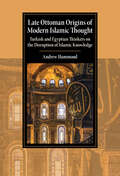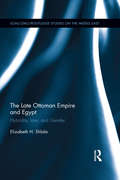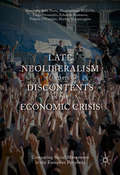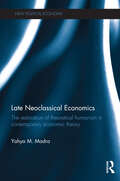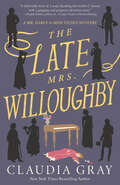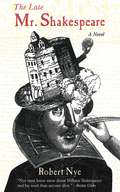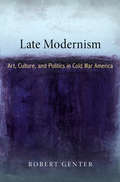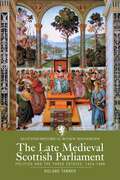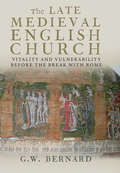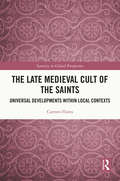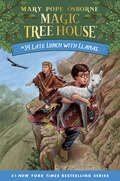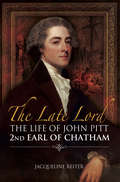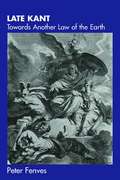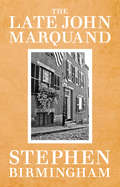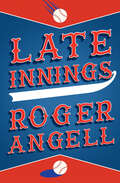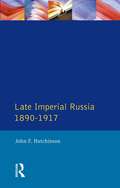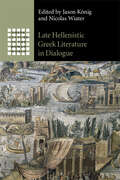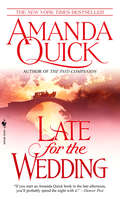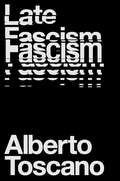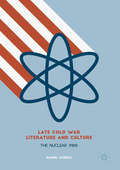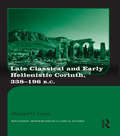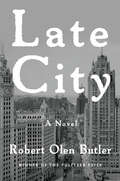- Table View
- List View
Late Ottoman Origins of Modern Islamic Thought: Turkish and Egyptian Thinkers on the Disruption of Islamic Knowledge (Cambridge Studies in Islamic Civilization)
by Andrew HammondIn this major contribution to Muslim intellectual history, Andrew Hammond offers a vital reappraisal of the role of Late Ottoman Turkish scholars in shaping modern Islamic thought. Focusing on a poet, a sheikh and his deputy, Hammond re-evaluates the lives and legacies of three key figures who chose exile in Egypt as radical secular forces seized power in republican Turkey: Mehmed Akif, Mustafa Sabri and Zahid Kevseri. Examining a period when these scholars faced the dual challenge of non-conformist trends in Islam and Western science and philosophy, Hammond argues that these men, alongside Said Nursi who remained in Turkey, were the last bearers of the Ottoman Islamic tradition. Utilising both Arabic and Turkish sources, he transcends disciplinary conventions that divide histories along ethnic, linguistic and national lines, highlighting continuities across geographies and eras. Through this lens, Hammond is able to observe the long-neglected but lasting impact that these Late Ottoman thinkers had upon Turkish and Arab Islamist ideology.
The Late Ottoman Empire and Egypt: Hybridity, Law and Gender (SOAS/Routledge Studies on the Middle East)
by Elizabeth H ShlalaLaw and identification transgressed political boundaries in the nineteenth-century Levant. Over the course of the century, Italo-Levantines- elite and common- exercised a strategy of resilient hybridity whereby an unintentional form of legal imperialism took root in Egypt. This book contributes to a vibrant strand of global legal history that places law and other social structures at the heart of competing imperial projects- British, Ottoman, Egyptian, and Italian among them. Analysis of the Italian consular and mixed court cases, and diplomatic records, in Egypt and Istanbul reveals the complexity of shifting identifications and judicial reform in two parts of the interactive and competitive plural legal regime. The rich court records show that binary relational categories fail to capture the complexity of the daily lives of the residents and courts of the late Ottoman empire. Over time and acting in their own self-interests, these actors exploited the plural legal regime. Case studies in both Egypt and Istanbul explore how identification developed as a legal form of property itself. Whereas the classical literature emphasized external state power politics, this book builds upon new work in the field that shows the interaction of external and internal power struggles throughout the region led to assorted forms of confrontation, collaboration, and negotiation in the region. It will be of interest to students, scholars, and readers of Middle East, Ottoman, and Mediterranean history. It will also appeal to anyone wanting to know more about cultural history in the nineteenth century, and the historical roots of contemporary global debates on law, migration, and identities.
Late Neoliberalism and its Discontents in the Economic Crisis
by Donatella Porta Francis O’connor Massimiliano Andretta Eduardo Romanos Tiago Fernandes Markos VogiatzoglouThis book analyses protests against the Great Recession in the European periphery. While social movements have long been considered as children of affluent times - or at least of times of opening opportunities - these protests defy such expectations, developing instead in moments of diminishing opportunities in both the economic and the political realms. Can social movement studies still be useful to understanding these movements of troubled times? The authors offer a positive answer to this question, although specify the need to bridge contentious politics with other fields, including political economy. They highlight differences in the social movements' strength and breadth and attempt to understand them in terms of three sets of dimensions: a) the specific characteristics of the socio-economic crisis and its consequences in terms of mobilization potential; b) the political reactions to it, in what we can define as political opportunities and threats; and c) the social movement cultures and structures that characterize each country. The book discusses these topics through a contextualized analysis of anti-austerity protest in the European periphery.
Late Neoclassical Economics: The restoration of theoretical humanism in contemporary economic theory (New Political Economy)
by Yahya M. MadraSeveral contemporary economic theories revolve around different concepts: market failures, institutions, transaction costs, information asymmetries, motivational diversity, cognitive limitations, strategic behaviors and evolutionary stability. In recent years, many economists have argued that the increase in circulation and mobilization of these new and heterogeneous concepts and their associated methodologies (e.g., experiments, evolutionary modelling, simulations) signify the death of neoclassical economics. Late Neoclassical Economics: The Restoration of Theoretical Humanism in Contemporary Economic Theory draws on the work of Louis Althusser, Michel Foucault and the Amherst School, to construct the concept of a self-transparent and self-conscious human subject (Homo economicus) as the theoretical humanist core of the neoclassical tradition. Instead of identifying the emergent heterogeneity as a break from neoclassicism, this book offers a careful genealogy of many of the new concepts and approaches - including evolutionary game theory, experimental economics and behavioural economics - and reads their elaboration as part of the restoration of the theoretical humanist core of the tradition. ‘Late neoclassical economics’ is therefore characterized as a collection of diverse approaches which have emerged in response to the drift towards structuralism. This book is suitable for those who study political economy, history of economic thought and philosophy of economics. The arguments put forward in this text will also resonate with anyone who is interested in the fate of the neoclassical tradition and the future of economic theory.
The Late Mrs. Willoughby (MR. DARCY & MISS TILNEY MYSTERY)
by Claudia GrayThe suspenseful follow-up to New York Times-bestselling author Claudia Gray's The Murder of Mr. Wickham: Juliet Tilney and Jonathan Darcy team up again to solve the murder of the scoundrel Willoughby's young wife.The Tilneys of Northanger Abbey are not entirely pleased to be sending their young daughter out into the social world again: the last house party she attended involved a murder—which she helped solve. She will be the guest of her new friend, Marianne Brandon, who has a scandalous shadow hanging over her. Even more troubling is the fact that Marianne's former suitor, the rakish John Willoughby, is setting up his household near by, complete with a young wife.The Darcys of Pemberley are thrilled that their eldest son has been invited to a country house party by an old schoolmate. Other former classmates will be there, for riding and shooting and other proper pastimes for young men. Jonathan is less taken with the idea of sharing a roof with his old bully, but when he finds himself reunited with his sleuthing partner, the radiant Miss Tilney, he doesn't mind so much.When Willoughby's young wife dies horribly in the midst of an elegant party, they have good reasons to spend a great deal of time together ferreting out the truth. As the local gentry, the sprawling Dashwood clan, and an old schoolmate of Jonathan's who is eager to add his "modern" scientific methods to the sleuthing duo's investigations (and perhaps get closer to Juliet than Jonathan is comfortable with) complicate the scene, eerie incidents suggest that the killer may strike again, and that the pair may be in far graver danger than they or their families could imagine.
The Late Mrs. Willoughby (MR. DARCY & MISS TILNEY MYSTERY #2)
by Claudia GrayThe suspenseful sequel to The Murder of Mr. Wickham, which sees Jonathan Darcy and Juliet Tilney reunited, and with another mystery to solve: the dreadful poisoning of the scoundrel Willoughby's new wife.&“An absolute page-turner full of well-plotted mystery and hints of simmering romance.... More of the Jane Austen characters we love (as well as those we love to hate).&” —Mia P. Manansala, author of Arsenic and AdoboCatherine and Henry Tilney of Northanger Abbey are not entirely pleased to be sending their eligible young daughter Juliet out into the world again: the last house party she attended, at the home of the Knightleys, involved a murder—which Juliet helped solve. Particularly concerning is that she intends to visit her new friend Marianne Brandon, who's returned home to Devonshire shrouded in fresh scandal—made more potent by the news that her former suitor, the rakish Mr. Willoughby, intends to take up residence at his local estate with his new bride.Elizabeth and Fitzwilliam Darcy of Pemberley are thrilled that their eldest son, Jonathan—who, like his father, has not always been the most socially adept—has been invited to stay with his former schoolmate, John Willoughby. Jonathan himself is decidedly less taken with the notion of having to spend extended time under the roof of his old bully, but that all changes when he finds himself reunited with his fellow amateur sleuth, the radiant Miss Tilney. And when shortly thereafter, Willoughby's new wife—whom he married for her fortune—dies horribly at the party meant to welcome her to town.With rumors flying and Marianne—known to be both unstable and previously jilted by the dead woman's newly made widower—under increased suspicion, Jonathan and Juliet must team up once more to uncover the murderer. But as they collect clues and close in on suspects, eerie incidents suggest that the killer may strike again, and that the pair are in far graver danger than they or their families could imagine.A VINTAGE ORIGINAL.
The Late Mr. Shakespeare: A Novel
by Robert NyeOur guide to the life of the Bard is an actor called Pickleherring, who asserts that as a boy he was an original member of Shakespeare's acting troupe. In an attic above a brothel in Restoration London-a half century after Shakespeare has departed the stage-Pickleherring, now an old man, sits down to write the full story of his former friend, mentor, and master. Fond, faithful Pickleherring has forgotten nothing over the years, and using sources both firsthand and far-fetched he means to set the record straight. Was Shakespeare ever actually "in love"? Did he write his own plays? Who was the Dark Lady of the Sonnets? Brilliantly in tune with today's Shakespeare renaissance, Robert Nye gives us an outrageous, language-loving, and edifying romp through the life and times of the greatest writer who ever lived.
Late Modernism: Art, Culture, and Politics in Cold War America (The Arts and Intellectual Life in Modern America)
by Robert GenterIn the thirty years after World War II, American intellectual and artistic life changed as dramatically as did the rest of society. Gone were the rebellious lions of modernism—Joyce, Picasso, Stravinsky—and nearing exhaustion were those who took up their mantle as abstract expressionism gave way to pop art, and the barren formalism associated with the so-called high modernists wilted before the hothouse cultural brew of the 1960s. According to conventional thinking, it was around this time that postmodernism with its characteristic skepticism and relativism was born.In Late Modernism, historian Robert Genter remaps the landscape of American modernism in the early decades of the Cold War, tracing the combative debate among artists, writers, and intellectuals over the nature of the aesthetic form in an age of mass politics and mass culture. Dispensing with traditional narratives that present this moment as marking the exhaustion of modernism, Genter argues instead that the 1950s were the apogee of the movement, as American practitioners—abstract expressionists, Beat poets, formalist critics, color-field painters, and critical theorists, among others—debated the relationship between form and content, tradition and innovation, aesthetics and politics. In this compelling work of intellectual and cultural history Genter presents an invigorated tradition of late modernism, centered on the work of Kenneth Burke, Ralph Ellison, C. Wright Mills, David Riesman, Jasper Johns, Norman Brown, and James Baldwin, a tradition that overcame the conservative and reactionary politics of competing modernist practitioners and paved the way for the postmodern turn of the 1960s.
The Late Medieval Scottish Parliament: Politics and the three Estates, 1424–1488
by Roland TannerIn this ground-breaking study of the medieval parliament, Roland Tanner gives the Scottish Parliament a human face by examining the actions and motives of those who attended. In the past, the Scottish Parliament was seen as a weak and ineffective institution – damned because of its failure to be more like its English counterpart. But Roland Tanner shows that the old picture of weakness is far from accurate. In its very different way, the Scottish Parliament was every bit as powerful as the English institution. The ‘Three Estates’ (the clergy, nobility and burgh representatives who attended Parliament) were able to wield a surprising degree of control over the Crown during the fifteenth century. For instance, they threatened to lock James I’s taxation in a box to which he, the king, would have no access, made James II swear not to alter acts of Parliament, and prevented him from using his own lands and wealth as patronage for his supporters, and forbade James III to leave the country. Roland Tanner has avoided a dry constitutional approach. Instead he has sought to bring Parliament to life through the people who attended, the reasons why they attended, and the complex interactions which occurred when all the most wealthy, powerful and ambitious people in the kingdom gathered in one place.
The Late Medieval English Church
by G. W. BernardThe later medieval English church is invariably viewed through the lens of the Reformation that transformed it. But in this bold and provocative book historian George Bernard examines it on its own terms, revealing a church with vibrant faith and great energy, but also with weaknesses that reforming bishops worked to overcome. Bernard emphasizes royal control over the church. He examines the challenges facing bishops and clergy, and assesses the depth of lay knowledge and understanding of the teachings of the church, highlighting the practice of pilgrimage. He reconsiders anti-clerical sentiment and the extent and significance of heresy. He shows that the Reformation was not inevitable: the late medieval church was much too full of vitality. But Bernard also argues that alongside that vitality, and often closely linked to it, were vulnerabilities that made the break with Rome and the dissolution of the monasteries possible. The result is a thought-provoking study of a church and society in transformation.
The Late Medieval Cult of the Saints: Universal Developments within Local Contexts (Sanctity in Global Perspective)
by Carmen FloreaThis is a book that explores the nature of sainthood in a region at the margins of medieval Latin Christendom. Defining the model of sanctity that characterized Transylvania between the fourteenth and sixteenth centuries, the study considers how the cults of saints functioned within specific local social and cultural contexts. Analysing case studies from a multi-ethnic region influenced by both the Latin and Eastern Christian traditions, this book provides a close reading of little-surveyed primary sources and offers a comprehensive understanding of sainthood in Transylvania, enhancing the broader study of medieval saints’ cults and their relationship to social power structures. It will be of great interest to scholars of medieval religion, researchers in medieval studies and religious studies scholars engaged in comparative research.
Late Marx and the Russian Road: Marx and the Peripheries of Capitalism (Monthly Review Press Classic Titles #26)
by Teodor ShaninExplores Marx’s attitude to “developing” societies. Includes translations of Marx’s notes from the 1880s, among the most important finds of the last century.
Late Lunch with Llamas (Magic Tree House (R) #34)
by Mary Pope OsborneThe #1 bestselling Magic Tree House series is ready to whisk you away through time with Jack and Annie--this time to South America!When the magic tree house whisks Jack and Annie to a mountainside, they are surprised to find farmers nearby. Then they learn that the farmer's baby llama has been stolen, and Jack and Annie vow to bring the little animal back to its owners. But the journey is treacherous--they must climb to the peak of Machu Picchu and climb back down in order to complete this mission. Jack and Annie have been on many dangerous travels, but can they survive this one? Track the facts with Jack and Annie in the nonfiction companion to this book: Llamas and the Andes.Did you know that there's a Magic Tree House book for every kid?Magic Tree House: Perfect for readers who are just beginning chapter booksMerlin Missions: More challenging adventures for the experienced readerFact Trackers: Nonfiction companions to your favorite Magic Tree House adventuresIf you're looking for Merlin Mission #34: Season of the Sandstorms, it was renumbered as part of the rebrand in 2017 as Merlin Mission #6.
The Late Lord: The Life of John Pitt–2nd Earl of Chatham
by Jacqueline ReiterThis biography of the second Earl of Chatham looks beyond his famous military failure to reveal one of the early nineteenth century’s most fascinating figures.John Pitt, 2nd Earl of Chatham, is one of the most enigmatic and overlooked figures of early nineteenth century British history. The elder brother of Pitt the Younger, he has long been consigned to history as the late Lord Chatham, the lazy commander-in-chief of the 1809 Walcheren expedition, whose inactivity and incompetence turned what should have been an easy victory into a disaster. In The Late Lord, Jacqueline Reiter presents a more nuanced and revealing portrait. During a twenty-year career at the heart of government, Pitt served in several important cabinet posts such as First Lord of the Admiralty and Master-General of the Ordnance. Yet despite his closeness to the Prime Minister and friendship with the Royal Family, political rivalries and private tragedy hampered his ascendance. Paradoxically for a man of widely admired diplomatic skills, his downfall owed as much to his personal insecurities and penchant for making enemies as it did to military failure.Using a variety of manuscript sources to tease Chatham from the records, this biography peels away the myths and places him for the first time in proper familial, political, and military context. It breathes life into a much-maligned member of one of Britain’s greatest political dynasties, revealing a deeply flawed man trapped in the shadow of his illustrious relatives.
Late Kant: Towards Another Law of the Earth
by Peter FenvesImmanuel Kant spent many of his younger years working on what are generally considered his masterpieces: the three Critiques. But his work did not stop there: in later life he began to reconsider subjects such as anthropology, and topics including colonialism, race and peace. In Late Kant, Peter Fenves becomes one of the first to thoroughly explore Kant's later writings and give them the detailed scholarly attention they deserve. In his opening chapters, Fenves examines in detail the various essays in which Kant invents, formulates and complicates the thesis of 'radical evil' - a thesis which serves as the point of departure for all his later writings. Late Kant then turns towards the counter-thesis of 'radical mean-ness', which states that human beings exist on earth for the sake of another species or race of human beings. The consequences of this startling thesis are that human beings cannot claim possession of the earth, but must rather prepare the earth for its rightful owners.Late Kant is the first book to develop the 'geo-ethics' of Kant's thought, and the idea that human beings must be prepared to concede their space for another kind of human. It is essential reading for anyone interested in the later works of Immanuel Kant.
The Late John Marquand: A Biography
by Stephen BirminghamThe Late John Marquand is an engrossing and well-studied literary biography of one of twentieth century America's finest writers of fiction, by the bestselling protégé who took up his mantle.
The Late John Marquand
by Stephen BirminghamThe acclaimed social historian and author of Our Crowd presents a colorful portrait of the Pulitzer Prize–winning writer. John Marquand, the great literary satirist and chronicler of New England elites, could have been a character in one of his own beloved novels. Here, Stephen Birmingham presents a lively narrative of Marquand&’s life, drawing on personal interviews with friends and family. Raised in Newburyport, Massachusetts, Marquand was both an insider and outcast of the old money set. After attending Harvard and serving overseas in World War I, he began writing stories that captured the lives, manners, and morals of wealthy families confined by their own privilege. Marquand himself joined the ranks of these exclusive families by marrying into them—twice. In The Late John Marquand, Birmingham provides an intimate portrait of the man behind such works as H. M. Pulham, Esquire, and The Late George Apley, which won the Pulitzer Prize in 1938.
Late Innings
by Roger AngellThe acclaimed New Yorker sportswriter examines the inner working of professional baseball, in these essays from the spring of 1977 to the summer of 1981.Late Innings takes fans far beyond the stadium view of the field and into the substrata of baseball as it is experienced by the people who make it happen. Celebrated as one of the game&’s finest chroniclers, Roger Angell shares his commentary on the money, fame, power, traditions, and social aspects of baseball during the late seventies and early eighties. Covering monumental events such as Reggie Jackson&’s three World Series home runs and the bitter ordeal of the 1981 players&’ strike, Angell offers a timeless perspective on the world of baseball to be enjoyed by fans of all ages.
Late Imperial Russia, 1890-1917 (Seminar Studies)
by John F. HutchinsonThis new interpretation of the final years of Imperial Russia provides a clear and concise introduction to a critical period in the history of modern Russia. Professor Hutchinson outlines the key problems facing the Tsarist regime, and the attitudes of its Liberal critics and revolutionary enemies. In particular, he considers how the monarchy was able to withstand the uprisings of 1904-06, but failed in 1917. This important new study provides an analysis of social, as well as political developments, and concludes with a brief historiographical essay which draws together alternative interpretations of the final years of the Tsars.
Late Hellenistic Greek Literature in Dialogue (Greek Culture in the Roman World)
by Jason König Nicolas WiaterLate Hellenistic Greek literature, both prose and poetry, stands out for its richness and diversity. Recent work has tended to take an author-by-author approach that underestimates the interconnectedness of the literary culture of the period. The chapters assembled here set out to change that by offering new readings of a wide range of late Hellenistic texts and genres, including historiography, geography, rhetoric and philosophy, together with many verse texts and inscriptions. In the process, they offer new insights into the various ways in which late Hellenistic literature engaged with its social, cultural and political contexts, while interrogating and revising some of the standard narratives of the relationship between late Hellenistic and imperial Greek literary culture, which are too often studied in isolation from each other. As a whole the book prompts us to rethink the place of late Hellenistic literature within the wider landscape of Greek and Roman literary history.
Late for the Wedding
by Amanda QuickNew York Times bestselling author Amanda Quick returns with a thrilling new venture into romance and mystery, featuring the most unusual, highly compatible--undeniably combustible--pairing of Tobias March and his mesmerizing partner, Lavinia Lake.An invitation to a country house party at Beaumont Castle provides a perfect solution to Tobias and Lavinia's most exasperating challenge: how to escape the chaos of London for a remote, relaxing--and above all romantic--retreat from prying eyes and wagging tongues. But the lovers' plans are foiled when their first cozy interlude of the weekend is disrupted by the appearance of a stunning woman from Tobias's past. Aspasia Gray's beauty is as haunting as her connection to Tobias. Her long-deceased fiancé was a friend of his--in addition to being an eccentric assassin. The mysterious nature of the bond between Tobias and Aspasia makes Lavinia more than a little uncomfortable. Especially as her first encounter with Aspasia occurs when she finds her in Tobias's bedchamber...It seems Aspasia is seeking protection--and solace--after receiving an ominous message that eerily recalls the past. Suddenly the obstacles standing betweenTobias and Lavinia appear greater than just a little London gossip--and far more deadly.When events at the castle suggest someone is imitating the dead killer's methods, the team of Lake and March fervently pursue the investigation--and each other--as their leads take them from Society's most elegant haunts--and most discreet hideaways--to London's shadiest backstreets. As their relationship heats up, so does the intrigue. Soon Lavinia will have to employ all her talents to flummox the scoundrel who so rudely interrupted her rendezvous. And then she and Tobias can get back to more pleasurable affairs.From the Hardcover edition.
Late Fascism: Race, Capitalism and the Politics of Crisis
by Alberto ToscanoHow do we understand the return of fascism today?In a world shaken by ecological, economic and political crises, the forces of authoritarianism and reaction seem to have the upper hand. How should we name, map and respond to this state of affairs?Late Fascism turns to theories of fascism produced in the past century, testing their capacity to illuminate our moment and challenging many of the commonplaces that debate on this extremely charged term devolves into. It can be tempting for any contemporary assessment of fascism to reach for historical analogy. Fascism is defined by returns and repetitions, but it is not best approached in terms of steps and checklists dictated by a selective reading of Italian Fascism or National Socialism.Rather than treating fascism as an unrepeatable phenomenon or identifying it with a settled configuration of European parties, regimes, and ideologies, Toscano approaches fascism as a problem and a process, one that is intimately linked to capitalism's demands for domination. Drawing especially on Black radical and anti-colonial theories of racial fascism, Late Fascism makes clear the limits of identifying fascism simply with the political violence of bygone European regimes. Developing anti-fascist theory is a vital and urgent task. From the "Great Replacement" to campaigns against critical race theory and "gender ideology", today's global far-right is launching lethal panics about the threats to traditional political, sexual and racial regimes. Late Fascism allows us to rediscover some truly inspiring anti-fascist thinkers, rooted in their turn in largely anonymous collective practices of worldmaking against domination, traditions of the oppressed that remain a resource for those set on dismantling the hierarchies and segregations that the partisans of Order and Tradition seek to revive and reimpose.
Late Cold War Literature and Culture
by Daniel CordleThis book analyses the 1980s as a nuclear decade, focusing on British and United States fiction. Ranging across genres including literary fiction, science fiction, post-apocalyptic fiction, graphic novels, children's and young adult literature, thrillers and horror, it shows how pressing nuclear issues were, particularly the possibility of nuclear war, and how deeply they penetrated the culture. It is innovative for its discussion of a "nuclear transatlantic," placing British and American texts in dialogue with one another, for its identification of a vibrant young adult fiction that resonates with more conventionally studied literatures of the period and for its analysis of a "politics of vulnerability" animating nuclear debates. Placing nuclear literature in social and historical contexts, it shows how novels and short stories responded not only to nuclear fears, but also crystallised contemporary debates about issues of gender, the environment, society and the economy.
Late Classical and Early Hellenistic Corinth: 338-196 BC (Routledge Monographs in Classical Studies)
by Michael D. DixonLate Classical and Early Hellenistic Corinth, 338-196 B.C. challenges the perception that the Macedonians' advent and continued presence in Corinth amounted to a loss of significance and autonomy. Immediately after Chaironeia, Philip II and his son Alexander III established close relations with Corinth and certain leading citizens on the basis of goodwill (eunoia). Mutual benefits and respect characterized their discourse throughout the remainder of the early Hellenistic period; this was neither a period of domination or decline, nor one in which the Macedonians deprived Corinthians of their autonomy. Instead, Corinth flourished while the Macedonians possessed the city. It was the site of a vast building program, much of which must be construed as the direct result of Macedonian patronage, evidence suggests strongly that those Corinthians who supported the Macedonians enjoyed great prosperity under them. Corinth's strategic location made it an integral part of the Macedonians' strategy to establish and maintain hegemony over the mainland Greek peninsula after Philip II's victory at Chaironeia. The Macedonian dynasts and kings who later possessed Corinth also valued its strategic position, and they regarded it as an essential component in their efforts to claim legitimacy due to its association with the Argead kings, Philip II and Alexander III the Great, and the League of Corinth they established. This study explicates the nature of the relationship between Corinthians and Macedonians that developed in the aftermath of Chaironeia, through the defeat at the battle of Kynoskephalai and the declaration of Greek Freedom at Isthmia in 196 B.C. Late Classical and Early Hellenistic Corinth is not simply the history of a single polis; it draws upon the extant literary, epigraphic, prosopographic, topographic, numismatic, architectural, and archaeological evidence to place Corinth within broader Hellenistic world. This volume, the full first treatment of the city in this period, contributes significantly to the growing body of scholarly literature focusing on the Hellenistic world and is a crucial resource for specialists in late Classical and early Hellenistic history.
Late City: A Novel
by Robert Olen ButlerThe Pulitzer Prize–winning author shares an “exceptionally nuanced, tender, funny, tragic, and utterly transfixing portrait” of one man’s troubled century (Booklist, starred review).At 115 years old, former newspaperman Sam Cunningham is also the last surviving veteran of World War I. As he prepares to die in a Chicago nursing home, the results of the 2016 presidential election come in—and he finds himself in a wide-ranging conversation with a surprising God. As the two review Sam’s life, the grand epic of the twentieth century comes sharply into focus.Sam grows up in Louisiana under the flawed morality of an abusive father. Eager to escape, Sam enlists in the army while still underage. Though the hardness his father instilled in him helps him make it out of World War I alive, it also prevents him from contending with the emotional wounds of war. Back in the United States, Sam moves to Chicago to begin a career as a newspaperman that will bring him close to the major historical turns of the twentieth century. There he meets his wife and has a son, whose fate counters Sam’s at almost every turn.As he contemplates his relationships—with his parents, his brothers in arms, his wife, his editor, and most importantly, his son—Sam is amazed at what he still has left to learn about himself after all these years.
